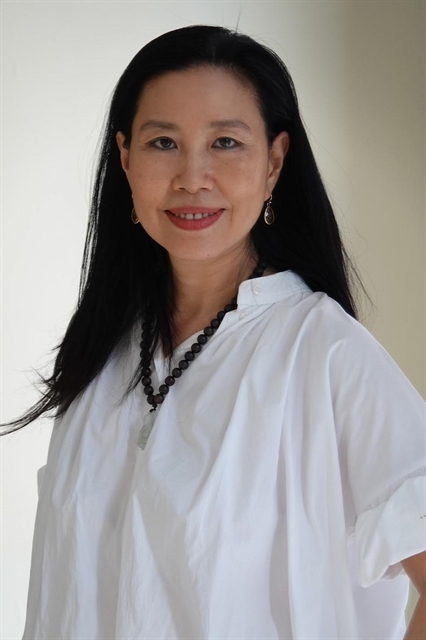
Playwright Vũ Hoàng Hoa. Photo Nguyễn Đình Toán
Vũ Hoàng Hoa is the grandchild of late writer and literary researcher Vũ Ngọc Phan. She has written novels and her recent play script Shadow of the Puppets has been performed by Việt Nam Drama Theatre.
The script was officially nominated for the 2023 Patrick White Award for scripts organised annually by Sydney Theatre and it was longlisted for the most exciting plays in the Griffin Theatre New Script Awards.
Việt Nam News reporter Nguyễn Bình chats with Hoa about her first script for theatre.
What inspired you to write the script? Why did you choose to write about same-sex love?
The sentence "Not everyone has a story to tell" from the book The Story of the Magic Mountain by Thomas Mann deeply resonates with me. Crafting an engaging story is not an easy task.
I wrote Shadow of the Puppets after witnessing how people treated my gay friend in Hà Nội. The play explores the agony of not being able to live according to our true desires. The director of Shadow of the Puppets, Tạ Tuấn Minh, commented that in the play, no character can fulfil their genuine wishes.
I write about same-sex love because the hardships, frustrations and sufferings in it are more significant than in heterosexual love. Gay people are born naturally like left-handed people, but they are discriminated against by social prejudices.
Especially in a society like ours, there are still people who consider homosexuality unfilial because they do not have children to carry on the family line. Children must satisfy their parents' model of happiness to be considered filial. That's why so many gay people have to sadly get married and have children to fulfil their duties, but they slowly die like prey, unable to escape from the tangled web of responsibility and fear.
After debuting last November in Hà Nội by artists from Việt Nam Drama Theatre, the play will return this Sunday. Do you like the play with a combination of puppets and artists on the stage?
I am impressed by Tadeusz Kantor's The Dead Class. The play combines the use of puppets and human actors in a creative way. In my own play, Shadow of the Puppets, puppets play a significant role with three of them representing the characters' alter egos.
On stage, I aim to create a mystical world where people can communicate with other entities through their thoughts, using a form of mystical energy.
How did you convince Việt Nam Drama Theatre to agree to stage your script while it was refused by some others?
The People's Artist Tạ Tuấn Minh, director of Shadow of the Puppets, and his assistant Bùi Phương Nga faced some challenges while trying to convince Việt Nam Drama Theatre to stage my script.
However, they persisted in their efforts and came up with a unique staging concept that combined puppetry, dance, sound and minimalist design. The theatre was intrigued by their innovative approach and decided to take a chance on the script.
Some say that the play is complicated and strange for the taste of Vietnamese audiences. Do you agree with them?
Shadow of the Puppets is becoming increasingly popular among Vietnamese audiences. For some, the unconventional script may be unfamiliar as it breaks the rules of episodic drama, but it is a source of passion and love for others.
The play creates a unique world that intertwines past, present, thoughts, dreams and fantasies. It inspires and moves the audience, making them reflect on the meaning of happiness, freedom and living true to oneself. It has become a must-see for many young people and profoundly impacts their lives.
What do you wish for the play? Bringing it to theatre festivals at home and abroad?
I am working towards getting Shadow of the Puppets to be performed nationwide, including HCM City, and attending international theatre festivals.
You have written novels, but this is the first time you have written a script. Will you write more scripts?
When I write, I strive to discover innovative ways of expressing myself, as conventional forms of writing tend to tire me out. I am particularly drawn to theatre as it combines various art forms.
In my plays, visuals, sounds, actors' movements and lighting are all significant components that work together to convey symbolism and meaning. As a result, I am committed to pursuing drama as my preferred mode of self-expression.
When you write a script, do you aim to simply write well, or do you set out to convey a message?
I write scripts to express myself through various artistic forms, creating a world where readers and audiences can find their own meaning.
My intention is not to convey a fixed message, but rather to stimulate thoughts and questions. I take my audience on a reflective journey to find an island of liberation, and they are an integral part of the creation of my work. VNS
OVietnam